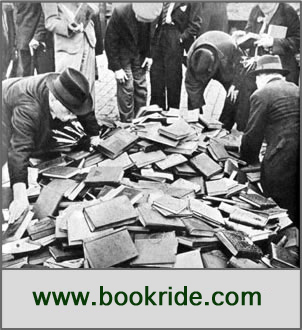
Ezra Pound. A LUME SPENTO. A. Antonini. 'In the City of Aldus' [Venice] 1908.
Current Selling Prices
$45000-$90000 /£24000-£48000
POETRY
A byword in rarity and high value, although Pound's second work 'A Quinzaine for this Yule' is also very rare. 150 copies printed (some sources say 100, a census has revealed 25 holdings, so 150 is more likely.) Published in Venice and sent to friends and literary movers and reviewers in Britain and America. In the same manner Basil Bunting's rare first book 'Redimiculum Matellarum' was sent from Milan in 1930 and Larkin's 'XX Poems' was posted from Belfast (some without stamps) in 1951. A1 in the Gallup bibliography where the misprints are noted (in many copies they are corrected in EP's hand.) The University of Delaware (from whom this pic comes, many thanks) appear to possess a not bad copy of the book (possibly lightly restored at the edges) and they sum up the influences on this work thus:
Ezra Pound’s early work, culminating in the publication of his first book, A Lume Spento, was infused with the spirit of the Pre-Raphaelites, of Romanticism, of William Butler Yeats’s Celtic nocturnes, and especially of Robert Browning...The book is his dedicated to his 'first friend William Brooke Smith: Painter, Dreamer of dreams.' He was going to dedicate it to fellow poet H.D. but Brooke Smith his closest friend had died at age 24. An enigmatic figure, possibly more than a platonic friend, he is described variously as a 90s aesthete, a sexual revolutionary, a dreamer and a dissolute hedonist.
The young Pound was also very influenced by Algernon Charles Swinburne, whom he claimed kept alive the notion of poetry as pure art, and whose rhythm and sound—both extremely important elements in Pound’s concept of poetry—he admired greatly. “Swinburne beats us all,” he wrote to Archibald MacLeish in 1926.
Henry James was another influence, less for his style than as an example of an American abroad in Europe (although Pound later described his long poem Hugh Selwyn Mauberley as a “Henry James novel in verse”). Pound wrote an extended commentary on James’s work after his death in 1916, which he called a “Baedeker to a Continent.”
Pound himself is buried
 in Venice not far from Stravinsky, Diaghilev, Joseph Brodsky and Baron Corvo. His grave is easily found. I went to Venice's Isle of the Dead (Isola di San Michele) in 2005 and found that whereas Pound is in a rather grand grave in the Russian section next to his partner Olga Rudge, Corvo is tucked away in one of those filing cabinet tombs about 12 feet off the ground. Hard to put flowers up there. The Baron died broke.
in Venice not far from Stravinsky, Diaghilev, Joseph Brodsky and Baron Corvo. His grave is easily found. I went to Venice's Isle of the Dead (Isola di San Michele) in 2005 and found that whereas Pound is in a rather grand grave in the Russian section next to his partner Olga Rudge, Corvo is tucked away in one of those filing cabinet tombs about 12 feet off the ground. Hard to put flowers up there. The Baron died broke.VALUE? A copy turned up in 2004 the property of the much liked Quentin Keynes, a major collector of highspot poetry. His copy was described thus:
'Occasional light marking and marginal paper flaws, variable light browning. Original light green printed wrappers, top edge trimmed, others uncut, later morocco-backed box (upper wrapper lightly spotted, creased and with short edge tears, some skilfully repaired, lower wrapper and spine replaced).'It made £21,510, a not very good copy but it had a few notes by an old girl friend of EP's called Viola Baxter. Another also less than brilliant copy with the usual couple of pencil corrections by Pound, but no association elements, made £21,420 at Bloomsbury also in 2004. In 1990 a reasonable but soiled and faded copy made $60,000 at the toney Bradley Martin Sale.
In general, poetry is not as favoured as it once was by the men in soft suits who tend to be the ones who pay the fat sums for books- so Pound's star may not be in the ascendant. However a sleek copy or an electric association (Eliot, Joyce, Gertrude Stein, Yeats. W. Lewis,H.D., F.M. Ford) could go ballistic. Pound's later anti semitism and crazed rants about usury have gone against him; Nabokov while also slagging off Brecht, Faulkner and Camus railed against 'the pretentious nonsense of Mr. Pound, that total fake.' Nevertheless we have many customers who come through the shop and swear by his Cantos; to my mind they outvote the sage of Montreux. [ W/Q * ]
FOOTNOTE. 'A Lume Spento' translates as 'With Tapers Quenched' a reference to a funeral in Dante. He was going to call it 'La Fraisne' after a poem in the book, until the death of his friend William Brooke Smith. Dante was also the inspiration for Eliot's sincere but measured 'thank you' to EP for his radical editing work on 'The Waste Land.' Eliot called Pound 'Il Miglior Fabbro' - the better craftsman, the better maker.


2 comments:
I visited San Michele recently, and it took me almost an hour to find Pound's grave, so "grand" is it. On the slab, someone had left a copy of the first page of A lume spento, published in Venice one hundred years previously, the paper now mouldering and sodden. The final resting place of Russian poet Iosif (Joseph) Brodsky is but a few feet away. I have never heard of the Harold Brodsky you mention.
Hey what's up?
Post a Comment